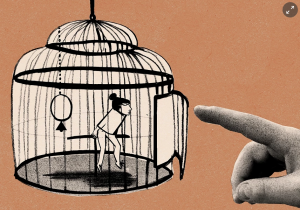By Helen Lewis
There’s a moment at the end of the film Suffragette that makes you gasp. Before the credits roll a simple list scrolls down the screen showing when women got the vote in countries around the world. It starts with New Zealand (1893) and ends with Saudi Arabia (2015), but the name that provokes the gasps is Switzerland. Gorgeous, snow-topped Switzerland, with its adorable cuckoo clocks and dubious attitude to Nazi gold, didn’t give women the vote until 1971.
For context, that’s after a man walked on the moon and the Beatles had broken up. “I don’t know what it is, but for some reason that seems to be the one that gets people,” agreed Suffragette’s writer Abi Morgan when I mentioned this to her. “I think it’s something about, you know, they make good chocolate – so surely they gave equality to women.”
Although I’m not discounting the chocolate connection, I have my own theory. Audiences are surprised because Switzerland is supposedly full of People Like Us: it’s an affluent western European nation, not a sand-blasted theocracy or a dirt-poor African dictatorship. And People Like Us believe in women’s equality. Don’t we?






